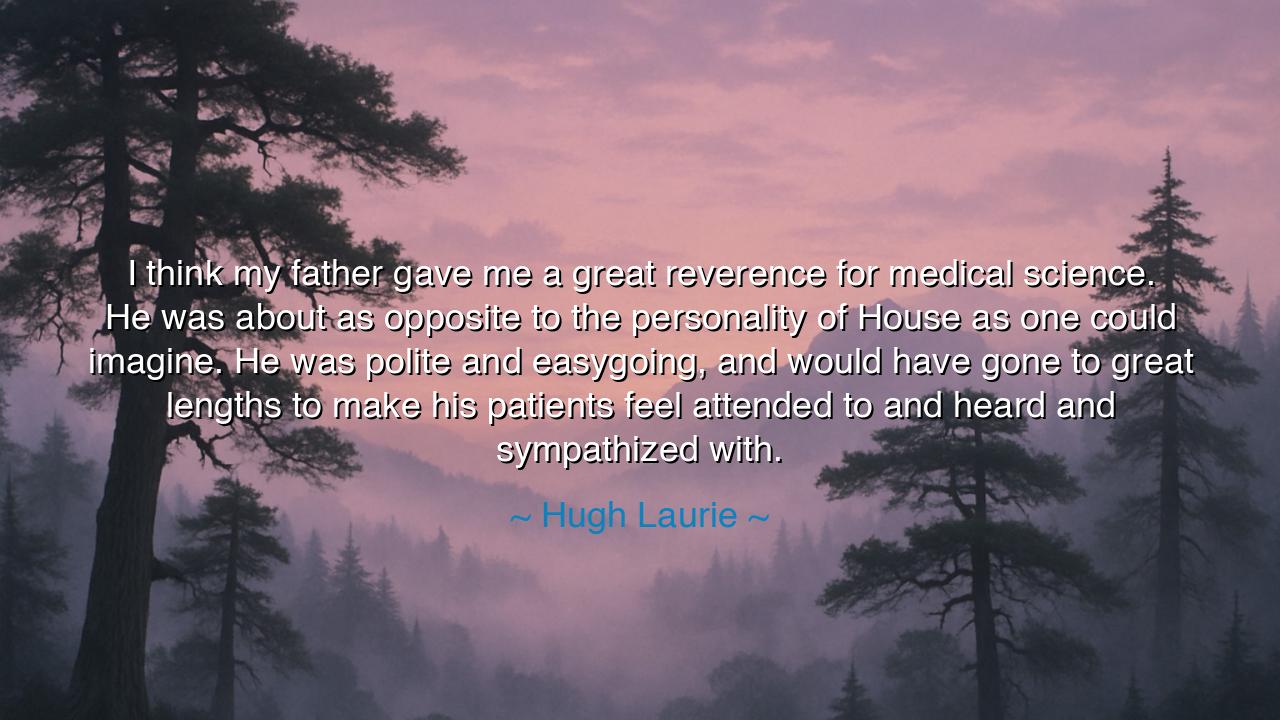
I think my father gave me a great reverence for medical science.
I think my father gave me a great reverence for medical science. He was about as opposite to the personality of House as one could imagine. He was polite and easygoing, and would have gone to great lengths to make his patients feel attended to and heard and sympathized with.






“I think my father gave me a great reverence for medical science. He was about as opposite to the personality of House as one could imagine. He was polite and easygoing, and would have gone to great lengths to make his patients feel attended to and heard and sympathized with.” Thus spoke Hugh Laurie, the actor and artist, whose words carry both admiration and introspection — a son reflecting upon the quiet greatness of his father. Beneath this reflection lies a profound truth: that medicine, when divorced from compassion, becomes mere mechanism, but when wedded to empathy, it becomes healing in its truest sense. Laurie’s father, himself a physician, embodied not the cold intellect of diagnosis, but the warmth of humanity, the art of care that dignifies both doctor and patient.
Laurie’s words stand as a bridge between two worlds — the fictional brilliance of Dr. Gregory House, the cynical, abrasive genius he portrayed, and the real-life gentleness of his father, who served not fame but humanity. Where House was analytical and detached, Laurie's father was tender and attentive. Yet, both represent sides of the same coin: the quest for truth through medical science, and the spirit of service that must accompany it. The elder Laurie was not just a healer of bodies, but a comforter of souls — one who, in his humility, understood that every patient is more than a case, more than a collection of symptoms. He listened, he sympathized, and in doing so, he reminded his son — and through him, all of us — that reverence for medicine must begin with reverence for life itself.
In the ancient world, the physician was often seen as a figure of dual power — a scientist of the body and a priest of compassion. The Greeks called him iatros, “the healer,” a servant of both reason and mercy. Hippocrates, the father of medicine, wrote that the doctor’s first duty was not merely to cure, but to “do no harm” — to act in a spirit of respect for the suffering of others. Laurie's father walked in that same lineage, one of the quiet warriors who fight their battles not with swords or crowns, but with stethoscopes and patience. His strength was not in drama, but in dignity; not in pride, but in presence. Such men do not shout their greatness — they practice it daily, unseen, through gentleness and discipline.
When Laurie says he gained from his father a “great reverence for medical science,” he is speaking not only of the intellectual wonder of the discipline, but of its moral beauty. To revere something is to recognize its sacredness — to see in it a reflection of the divine. His father’s life, polite and easygoing though it was, revealed that medicine, rightly practiced, is not simply a profession but a calling, a covenant between human need and human compassion. Through observation, study, and sacrifice, the physician becomes a vessel of healing — yet without humility, that vessel turns hollow. Thus, Laurie’s reverence was not only for science itself, but for the spirit in which it was practiced.
Consider the story of Dr. Edward Jenner, the humble Englishman who, through observation and courage, discovered the smallpox vaccine. He, too, did not chase fame or fortune, but sought only to ease the suffering of others. Like Laurie’s father, Jenner’s strength lay in empathy — in the willingness to listen to the pain of the people around him, to watch, to care, and to act with integrity. His discovery changed the world, but it began with a simple act of compassion — of seeing others not as subjects of study, but as souls in need of mercy. Laurie’s father would have understood this truth well: that every act of medical service, however small, is an act of reverence for life.
In contrast, Laurie’s portrayal of House reveals the danger of brilliance without empathy — of intellect untempered by warmth. House’s genius was undeniable, but his detachment from human feeling rendered him incomplete. Through his father’s example, Hugh Laurie understood what his character could not: that knowledge without kindness is power without purpose. His reverence for his father’s way — his gentleness, his sympathy, his care — is a lesson for every generation of healers, scientists, and leaders alike: that mastery must always be softened by mercy, and logic must be illuminated by love.
So, my children, take this teaching to heart: the highest form of knowledge is compassion. Whether you are a physician, a scholar, or an artist, let your work be guided by empathy as much as by skill. Listen before you speak; understand before you judge; and when you serve, do so with humility, for it is not the sharpest mind but the kindest heart that heals the deepest wounds. Remember the example of Hugh Laurie’s father — a man of calm strength, whose reverence for medicine was born from his reverence for people.
Let this be the legacy you carry forward: to see knowledge as sacred, service as noble, and compassion as divine. The world will always need its Houses — its thinkers and challengers — but it will never survive without its healers. Therefore, be like the elder Laurie: steady, kind, and wise. Let your reverence for science be matched by your reverence for humanity. For in that balance, the true art of healing — and the essence of greatness — is found.






AAdministratorAdministrator
Welcome, honored guests. Please leave a comment, we will respond soon